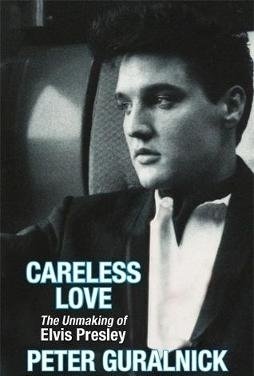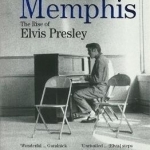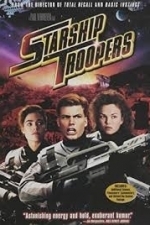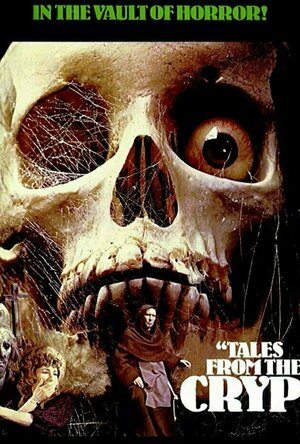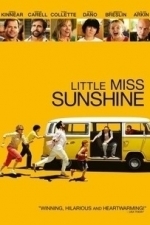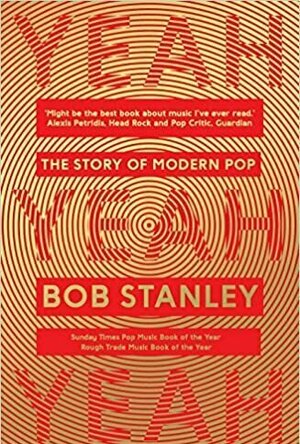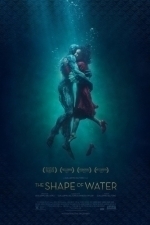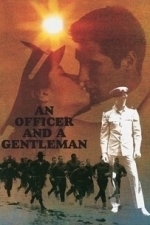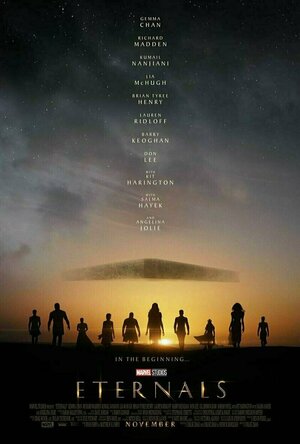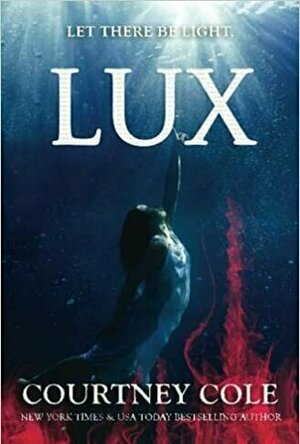Search
Search results
Beck recommended Careless Love: Unmaking of Elvis Presley in Books (curated)
Beck recommended Last Train to Memphis: The Rise of Elvis Presley in Books (curated)
Darren (1599 KP) rated Starship Troopers (1997) in Movies
Jul 7, 2019 (Updated Nov 25, 2019)
Verdict: Instant Classic
Story: Starship Troopers starts in a world where humans are not at war with a bug planet across the galaxy, students and young people are expected to join the federal service to become citizens. Johnny Rico (Can Dien), Dizzy (Meyer), Carl (Harris) and Carmen (Richards) all have their sights set on enlisting, Johnny and Dizzy are mobile infantry, while Carmen has bigger sights of being a pilot and Carl has his sights set on military intelligence, with his mind reading ability.
While Rico is going through his training and constant battles with the flashy Ace (Busey) battling for squad leader, Carmen is flourishing in the flight academy, but this is just training, now they must go into combat against the giant deadly bugs.
Thoughts on Starship Troopers
Characters – Johnny Rico comes from a wealthy family that want to send him to Harvard, but he has other plans, he wants to become a citizen, which means he must join the military, here he excels in training until a mistakes sees him disgraced. He loses his family and will remaining fighting under a new squad leader, proving himself as one of the best soldiers in the infantry. Dizzy has spent her school life crushing over Rico, she follows him to mobile infantry, proving herself as one of the best soldiers. Carmen is the girlfriend of Johnny’s through school, she has set her sights on becoming a pilot in the Starfleet, something her grades could make easy for her, she proves an asset to the fleet rising up the ranks with ease. Ace is the rival of Rico’s in training, they both want squad leader and with the rivalry they become brothers in arms.
Performances – Casper Van Dien in the leading role makes himself remember forever with his character, this will define his career without question. Dina Meyer shines too, while this cast is fantastic and understands just what movie they are in. Denise Richard has been criticised before, but here she works in the modern future world and Jake Busey add more comedy as times to his role.
Story – The story here takes us to the future where humans are waged in a war with bugs from across the galaxy, we see how the soldiers and pilots are dealing with the increasing threat they are going to be facing. This story does present itself in a satirical look at the military behaviour and how it can become a propaganda machine forcing young people into joining under false promises, it also shows how humans will always look to conquer another area no matter how outnumbered or out of place they are in their invasion behaviour. Plenty of this story over accentuates the idea of what is going on, which will add moments of comedy.
Action/Sci-Fi – The action in the film is war style military attacks with laser bullets flying literally everywhere and the bugs ripping bodies apart. The sci-fi side of the film shows us just how far the human race has come with transportation across the galaxy, despite not giving them the brains when it comes to war.
Settings – The world created is fantastic with Earth looking futuristic without being all that different, while the bug planet feels like a battleground.
Special Effects – The effects in the film are also flawless, with a mix of practical and CGI which barely look like they have dated even after being over 20 years old.
Scene of the Movie – The first battle shows the scale of the war.
That Moment That Annoyed Me – Nothing really.
Final Thoughts – This is one of the best sci-fi films you will see, it is wildly over the top and doesn’t miss a beat with style that knows just what the film is meant to be.
Overall: Fun, Brilliant and Entertaining.
Story: Starship Troopers starts in a world where humans are not at war with a bug planet across the galaxy, students and young people are expected to join the federal service to become citizens. Johnny Rico (Can Dien), Dizzy (Meyer), Carl (Harris) and Carmen (Richards) all have their sights set on enlisting, Johnny and Dizzy are mobile infantry, while Carmen has bigger sights of being a pilot and Carl has his sights set on military intelligence, with his mind reading ability.
While Rico is going through his training and constant battles with the flashy Ace (Busey) battling for squad leader, Carmen is flourishing in the flight academy, but this is just training, now they must go into combat against the giant deadly bugs.
Thoughts on Starship Troopers
Characters – Johnny Rico comes from a wealthy family that want to send him to Harvard, but he has other plans, he wants to become a citizen, which means he must join the military, here he excels in training until a mistakes sees him disgraced. He loses his family and will remaining fighting under a new squad leader, proving himself as one of the best soldiers in the infantry. Dizzy has spent her school life crushing over Rico, she follows him to mobile infantry, proving herself as one of the best soldiers. Carmen is the girlfriend of Johnny’s through school, she has set her sights on becoming a pilot in the Starfleet, something her grades could make easy for her, she proves an asset to the fleet rising up the ranks with ease. Ace is the rival of Rico’s in training, they both want squad leader and with the rivalry they become brothers in arms.
Performances – Casper Van Dien in the leading role makes himself remember forever with his character, this will define his career without question. Dina Meyer shines too, while this cast is fantastic and understands just what movie they are in. Denise Richard has been criticised before, but here she works in the modern future world and Jake Busey add more comedy as times to his role.
Story – The story here takes us to the future where humans are waged in a war with bugs from across the galaxy, we see how the soldiers and pilots are dealing with the increasing threat they are going to be facing. This story does present itself in a satirical look at the military behaviour and how it can become a propaganda machine forcing young people into joining under false promises, it also shows how humans will always look to conquer another area no matter how outnumbered or out of place they are in their invasion behaviour. Plenty of this story over accentuates the idea of what is going on, which will add moments of comedy.
Action/Sci-Fi – The action in the film is war style military attacks with laser bullets flying literally everywhere and the bugs ripping bodies apart. The sci-fi side of the film shows us just how far the human race has come with transportation across the galaxy, despite not giving them the brains when it comes to war.
Settings – The world created is fantastic with Earth looking futuristic without being all that different, while the bug planet feels like a battleground.
Special Effects – The effects in the film are also flawless, with a mix of practical and CGI which barely look like they have dated even after being over 20 years old.
Scene of the Movie – The first battle shows the scale of the war.
That Moment That Annoyed Me – Nothing really.
Final Thoughts – This is one of the best sci-fi films you will see, it is wildly over the top and doesn’t miss a beat with style that knows just what the film is meant to be.
Overall: Fun, Brilliant and Entertaining.
Darren (1599 KP) rated Tales From the Crypt (1972) in Movies
Oct 14, 2019
Characters – Where this film is an anthology we don’t get too much time with each character, Joanne is a married woman with her own desires for life, showing a darker side after killer her husband on Christmas Eve. Carl Maitland is a married man that is planning on leaving his wife and children, he is involved in an accident which brings into a new lease of horror. Grimsdyke is an older man, he has lived with his wife in one home, with her passed away he wants to die in this house and must deal with the snotty neighbours that is trying to force him out. Jason is a businessman that has spent more than he has earnt forcing him to face bankruptcy for his actions. Rogers is the final story as a manager of home, he comes in with his strict ideas struggle to connect with the people he is meant to be caring for.
Performances – By being an anthology the stars only get limited time, Joan Collins gets the ball rolling as is good in her role with us believing how calculated her actions are. Ian Hendry is solid in his role, he is behind the camera for the most part making it hard to believe everything. Peter Cushing shines as the kindly old man that is getting pushed out of town. Richard Greene is solid enough without getting too much time to show us what makes his character unique. Nigel Patrick does make this character one of the more unlikable with ease.
Story – The story here takes us down the horror anthology line, we get to see five stories of five characters deaths, this does give us something different in each side of the horror scale, we know some are shorter than others with Blind Alleys and Poetic Justice being the stand out of the five stories. There is a big twist in the connection to the stories, but if you do know the TV show you will know the outcome. For a horror anthology this is everything you need without being to the extremes they go nowadays. Each short could easily become a longer film which is always positive.
Horror – When it comes to horror we sometimes get to best moments in shorts, anthologies give us a chance to experience different types of horror which will offer something for all horror fans.
Settings – Each film takes us to the world where the character comes from which shows us how the normal lives they live have the darker secrets.
Special Effects – The effects in the film are good through the film they show us what is capable with good practical effects.
Scene of the Movie – Blind Alleys when the door opens.
That Moment That Annoyed Me – Some stories are too short.
Final Thoughts – This is a good anthology for horror, it gets the best moments correct and keeps us guessing to what will happen to the characters involved.
Overall: Simple anthology.
Performances – By being an anthology the stars only get limited time, Joan Collins gets the ball rolling as is good in her role with us believing how calculated her actions are. Ian Hendry is solid in his role, he is behind the camera for the most part making it hard to believe everything. Peter Cushing shines as the kindly old man that is getting pushed out of town. Richard Greene is solid enough without getting too much time to show us what makes his character unique. Nigel Patrick does make this character one of the more unlikable with ease.
Story – The story here takes us down the horror anthology line, we get to see five stories of five characters deaths, this does give us something different in each side of the horror scale, we know some are shorter than others with Blind Alleys and Poetic Justice being the stand out of the five stories. There is a big twist in the connection to the stories, but if you do know the TV show you will know the outcome. For a horror anthology this is everything you need without being to the extremes they go nowadays. Each short could easily become a longer film which is always positive.
Horror – When it comes to horror we sometimes get to best moments in shorts, anthologies give us a chance to experience different types of horror which will offer something for all horror fans.
Settings – Each film takes us to the world where the character comes from which shows us how the normal lives they live have the darker secrets.
Special Effects – The effects in the film are good through the film they show us what is capable with good practical effects.
Scene of the Movie – Blind Alleys when the door opens.
That Moment That Annoyed Me – Some stories are too short.
Final Thoughts – This is a good anthology for horror, it gets the best moments correct and keeps us guessing to what will happen to the characters involved.
Overall: Simple anthology.
Sarah (7800 KP) rated Little Miss Sunshine (2006) in Movies
Mar 24, 2021
Adorably heartwarming
Film #17 on the 100 Movies Bucket List: Little Miss Sunshine
Little Miss Sunshine is a quirky gem of an indie film from 2006 that whilst a favourite of mine and Oscar nominated, has likely flown below the radar for many mainstream viewers. Which is a huge shame as this is such a fun, heartwarming and enjoyable film
Directed by husband and wife team Jonathan Dayton and Valerie Faris, Little Miss Sunshine follows the life of the dysfunctional Hoover family from New Mexico. The Hoovers are a family of unfortunates, misfits and losers, and probably one of the most realistic family depictions you’ll ever seen on screen outside of reality TV. There’s Sheryl (Toni Collette), the harassed mum who keeps her family fed on fast food. Dad Richard (Greg Kinnear) who’s trying to peddle a failing business that focuses on teaching others the secrets to success. Grandpa Edwin (Alan Arkin), an ageing hippie with a drug habit that has been kicked out of his retirement home. Sheryl’s brother Frank (Steve Carell), a gay man currently recovering from a suicide attempt after his partner left him. Son Duane (Paul Dano) who’s goal to get into flight school has led him to take a vow of silence. And finally there’s young daughter Olive (Abigail Breslin), who’s obsession with beauty pageants leads the family to take a cross country trip in an ageing VW van to help her compete in the Little Miss Sunshine pageant. Along the way, the family encounter a variety of mishaps and events that can potentially change their lives.
The Hoover family for the most part are ridiculously lovable and this is entirely down to their flaws that they are so likeable. Aside from Dad Richard who has a number of questionable ethics and morals that demean others, the family and their unique quirky personalities are the main reason why this film is so enjoyable. And the fact that the entire family are all brought together by young Olive across the span of the film makes this incredibly heartwarming. Olive is an underdog and being realistic, not the type of girl who you’d see in your typical American beauty pageant, but you still find yourself rooting for her all the same.
The cast are fantastic and while you can always rely on Toni Collette, Alan Arkin and Greg Kinnear, it’s Steve Carell and Abigail Breslin that shine brightest. Until this, I didn’t think Steve Carell could do serious and especially not a role that like. But he excels, bringing a sad, intelligent air to Frank and personally I think this is his best role to date. And then there’s Abigail Breslin, a 9 year old who steals the show and pulls the entire cast and film together. Together with a clever, well written script, the cast pull together a heartwarming and surprisingly funny film where emotions and family are key to an eventful road trip.
What I enjoyed the most about Little Miss Sunshine is that while the journey the family take is obviously most important, we do at least get the joy of seeing Olive enter the beauty pageant and this is such a fitting end to the story. There may be some slightly unbelievable or predictable events that occur across the journey (the police traffic stop being one), but ultimately you come out of this feeling incredibly satisfied and rather warm and fuzzy inside. One of the most enjoyable family road trip movies I’ve ever seen.
Little Miss Sunshine is a quirky gem of an indie film from 2006 that whilst a favourite of mine and Oscar nominated, has likely flown below the radar for many mainstream viewers. Which is a huge shame as this is such a fun, heartwarming and enjoyable film
Directed by husband and wife team Jonathan Dayton and Valerie Faris, Little Miss Sunshine follows the life of the dysfunctional Hoover family from New Mexico. The Hoovers are a family of unfortunates, misfits and losers, and probably one of the most realistic family depictions you’ll ever seen on screen outside of reality TV. There’s Sheryl (Toni Collette), the harassed mum who keeps her family fed on fast food. Dad Richard (Greg Kinnear) who’s trying to peddle a failing business that focuses on teaching others the secrets to success. Grandpa Edwin (Alan Arkin), an ageing hippie with a drug habit that has been kicked out of his retirement home. Sheryl’s brother Frank (Steve Carell), a gay man currently recovering from a suicide attempt after his partner left him. Son Duane (Paul Dano) who’s goal to get into flight school has led him to take a vow of silence. And finally there’s young daughter Olive (Abigail Breslin), who’s obsession with beauty pageants leads the family to take a cross country trip in an ageing VW van to help her compete in the Little Miss Sunshine pageant. Along the way, the family encounter a variety of mishaps and events that can potentially change their lives.
The Hoover family for the most part are ridiculously lovable and this is entirely down to their flaws that they are so likeable. Aside from Dad Richard who has a number of questionable ethics and morals that demean others, the family and their unique quirky personalities are the main reason why this film is so enjoyable. And the fact that the entire family are all brought together by young Olive across the span of the film makes this incredibly heartwarming. Olive is an underdog and being realistic, not the type of girl who you’d see in your typical American beauty pageant, but you still find yourself rooting for her all the same.
The cast are fantastic and while you can always rely on Toni Collette, Alan Arkin and Greg Kinnear, it’s Steve Carell and Abigail Breslin that shine brightest. Until this, I didn’t think Steve Carell could do serious and especially not a role that like. But he excels, bringing a sad, intelligent air to Frank and personally I think this is his best role to date. And then there’s Abigail Breslin, a 9 year old who steals the show and pulls the entire cast and film together. Together with a clever, well written script, the cast pull together a heartwarming and surprisingly funny film where emotions and family are key to an eventful road trip.
What I enjoyed the most about Little Miss Sunshine is that while the journey the family take is obviously most important, we do at least get the joy of seeing Olive enter the beauty pageant and this is such a fitting end to the story. There may be some slightly unbelievable or predictable events that occur across the journey (the police traffic stop being one), but ultimately you come out of this feeling incredibly satisfied and rather warm and fuzzy inside. One of the most enjoyable family road trip movies I’ve ever seen.
Alexis Petridis recommended Yeah Yeah Yeah: The Story of Modern Pop in Books (curated)
Bob Mann (459 KP) rated The Shape of Water (2017) in Movies
Sep 29, 2021
A mystical tale of fish and fingers.
With perfect timing after scooping 13 Oscar nominations, “The Shape of Water” arrives for preview screenings in the UK. Is it worth all the hype?
Well, in a word, yes.
Not since Spielberg entranced the world in 1982 with a love story between an isolated and lonely child and an alien, stranded a million light-years from home, have we seen a magical fairy-tale so well told.
Cleaning up at the (box) office. Sally Hawkins and Doug Jones as the creature.
Here Lewisham’s own Sally Hawkins (“Paddington”, “Godzilla“) plays Elisa Esposito, an attractive but mousy mute living above a cinema and next door to her best friend: a struggling artist called Giles (Richard Jenkins). Sexually-frustrated, Elisa works out those tensions in the bath every morning before heading off to work as a cleaner at a government research institute. Together with partner Zelda Fuller (Octavia Spencer, “Hidden Figures“) she is asked to clean a highly secured room where a mysterious aquatic creature is being studied by the cruel and militaristic Strickland (Michael Shannon, “Midnight Special“, “Nocturnal Animals“) and the more compassionate scientist Hoffstetler. (The latter is played by Michael Stuhlbarg (“Miss Sloane“, “Steve Jobs“) in a performance that wasn’t recognised by the Academy, but for me really held the film’s story together). Elisa forms a relationship with the creature, and as the scientific investigations turn darker, she becomes determined to help him.
When you think about it, the similarities in the screenplay with E.T. are quite striking. But this is most definitely not a kid’s film, containing full frontal nudity, sex and some considerable violence, some of it “hands-over-the-eyes” worthy. Most of this violence comes courtesy of Shannon’s character, who is truly monstrous. He is uncontrollably vicious, single-minded and amoral: a hand over the mouth to silence his wife during vigourous sex cleverly belies where his true lust currently lies. (Shannon is just so convincing in all of his roles that, after “Nocturnal Animals“, it is a bit of a surprise to see that he is still alive and well!)
It’s worth pointing out for balance at this point that my wife thought this portrayal was over-egged for its villany, and she rated the film less highly than I did because of it.
Michael Shannon as evil incarnate.
So its no Oscar nomination this time for Shannon as a supporting actor. But that honour goes to Richard Jenkins, who is spectacularly good as the movie-musical-loving and pie-munching neighbour who is drawn unwillingly into Elisa’s plans. Giles is a richly fashioned character – also the film’s narrator – who struggles to fit in with the cruel and rascist 1962 world that he finds himself in. “Sometimes I think I was born too early or too late for my life” he bemoans to the creature whose loneliness he relates to. A scene in a cafe where he fastidiously wipes all traces of pie-filling from his tongue is masterfully done.
Richard Hawkins and Sally Hawkins, hatching a plan.
Octavia Spencer is also Oscar nominated for Best Supporting Actress, and it’s a magical partnership she shares with Hawkins, with each bouncing off each other wonderfully.
This leads to a ‘no brainer’ Oscar nomination for Sally Hawkins who delivers a star turn. She has to go through such a huge range of emotions in this film, and she genuinely makes you really care about the outcome like few films this year. It’s a little tricky since I haven’t seen “I Tonya” or “Ladybird” yet, but I would have thought that Ms Hawkins is going to possibly give Frances McDormand the closest run for her money on March 4th. My money would still be on McDormand for “3 Billboards Outside Ebbing, Missouri“, but the Oscar voters are bound to love “The Shape of Water”. For like “La La Land” last year, the film is (rather surprisingly for me) another love letter to Hollywood’s golden years, with Elisa and Giles living out their lives with classic movie music and dance numbers: a medium that Elisa only ever truly finds here “voice” through.
Eliza and Zelda about to give two fingers to the establishment.
In the technical categories the Oscar nominations were for Cinematography (Dan Laustsen); Film Editing (Sidney Wolinsky); Sound Editing (Nathan Robitaille and Nelson Ferreira); Sound Mixing (Glen Gauthier, Christian Cooke and Brad Zoern); Production Design (Paul D. Austerberry, Jeffrey A. Melvin and Shane Vieau); Original Score (Alexandre Desplat) and Costume Design (Luis Sequeira). And you really wouldn’t want to bet against any of these not to win, for the film is a technical delight. Right from the dreamlike opening titles (arguably, they missed a deserved nomination here for Visual Effects), the film is gorgeous to look at, with such brilliant detail in the production design that there is interesting stuff to look at in every frame. And the film editing is extraordinary: Elisa wobbles on the bucket she’s standing on, but it’s Strickland’s butt, perched on a table, that slips off. This is a film that deserves multiple repeat viewings.
The monster feeding the monster. Nick Searcy as General Hoyt with Strickland (Michael Shannon).
An the helm is the multi-talented Guillermo del Toro (“Pacific Rim”, “Crimson Peak”) who both directed and co-wrote the exceptionally smart screenplay (with Vanessa Taylor, “Divergent”) and is nominated for both. I actually found the story to be rather predictable, as regards Elisa’s story arc, but that in no way reduced my enjoyment of the film. For the “original screenplay” is nothing if not “original”…. it’s witty, intelligent and shocking at different turns.
The violence and sex won’t be for everyone… but this is a deep and rich movie experience that everyone who loves the movies should at least appreciate… hopefully in a dry cinema!
Well, in a word, yes.
Not since Spielberg entranced the world in 1982 with a love story between an isolated and lonely child and an alien, stranded a million light-years from home, have we seen a magical fairy-tale so well told.
Cleaning up at the (box) office. Sally Hawkins and Doug Jones as the creature.
Here Lewisham’s own Sally Hawkins (“Paddington”, “Godzilla“) plays Elisa Esposito, an attractive but mousy mute living above a cinema and next door to her best friend: a struggling artist called Giles (Richard Jenkins). Sexually-frustrated, Elisa works out those tensions in the bath every morning before heading off to work as a cleaner at a government research institute. Together with partner Zelda Fuller (Octavia Spencer, “Hidden Figures“) she is asked to clean a highly secured room where a mysterious aquatic creature is being studied by the cruel and militaristic Strickland (Michael Shannon, “Midnight Special“, “Nocturnal Animals“) and the more compassionate scientist Hoffstetler. (The latter is played by Michael Stuhlbarg (“Miss Sloane“, “Steve Jobs“) in a performance that wasn’t recognised by the Academy, but for me really held the film’s story together). Elisa forms a relationship with the creature, and as the scientific investigations turn darker, she becomes determined to help him.
When you think about it, the similarities in the screenplay with E.T. are quite striking. But this is most definitely not a kid’s film, containing full frontal nudity, sex and some considerable violence, some of it “hands-over-the-eyes” worthy. Most of this violence comes courtesy of Shannon’s character, who is truly monstrous. He is uncontrollably vicious, single-minded and amoral: a hand over the mouth to silence his wife during vigourous sex cleverly belies where his true lust currently lies. (Shannon is just so convincing in all of his roles that, after “Nocturnal Animals“, it is a bit of a surprise to see that he is still alive and well!)
It’s worth pointing out for balance at this point that my wife thought this portrayal was over-egged for its villany, and she rated the film less highly than I did because of it.
Michael Shannon as evil incarnate.
So its no Oscar nomination this time for Shannon as a supporting actor. But that honour goes to Richard Jenkins, who is spectacularly good as the movie-musical-loving and pie-munching neighbour who is drawn unwillingly into Elisa’s plans. Giles is a richly fashioned character – also the film’s narrator – who struggles to fit in with the cruel and rascist 1962 world that he finds himself in. “Sometimes I think I was born too early or too late for my life” he bemoans to the creature whose loneliness he relates to. A scene in a cafe where he fastidiously wipes all traces of pie-filling from his tongue is masterfully done.
Richard Hawkins and Sally Hawkins, hatching a plan.
Octavia Spencer is also Oscar nominated for Best Supporting Actress, and it’s a magical partnership she shares with Hawkins, with each bouncing off each other wonderfully.
This leads to a ‘no brainer’ Oscar nomination for Sally Hawkins who delivers a star turn. She has to go through such a huge range of emotions in this film, and she genuinely makes you really care about the outcome like few films this year. It’s a little tricky since I haven’t seen “I Tonya” or “Ladybird” yet, but I would have thought that Ms Hawkins is going to possibly give Frances McDormand the closest run for her money on March 4th. My money would still be on McDormand for “3 Billboards Outside Ebbing, Missouri“, but the Oscar voters are bound to love “The Shape of Water”. For like “La La Land” last year, the film is (rather surprisingly for me) another love letter to Hollywood’s golden years, with Elisa and Giles living out their lives with classic movie music and dance numbers: a medium that Elisa only ever truly finds here “voice” through.
Eliza and Zelda about to give two fingers to the establishment.
In the technical categories the Oscar nominations were for Cinematography (Dan Laustsen); Film Editing (Sidney Wolinsky); Sound Editing (Nathan Robitaille and Nelson Ferreira); Sound Mixing (Glen Gauthier, Christian Cooke and Brad Zoern); Production Design (Paul D. Austerberry, Jeffrey A. Melvin and Shane Vieau); Original Score (Alexandre Desplat) and Costume Design (Luis Sequeira). And you really wouldn’t want to bet against any of these not to win, for the film is a technical delight. Right from the dreamlike opening titles (arguably, they missed a deserved nomination here for Visual Effects), the film is gorgeous to look at, with such brilliant detail in the production design that there is interesting stuff to look at in every frame. And the film editing is extraordinary: Elisa wobbles on the bucket she’s standing on, but it’s Strickland’s butt, perched on a table, that slips off. This is a film that deserves multiple repeat viewings.
The monster feeding the monster. Nick Searcy as General Hoyt with Strickland (Michael Shannon).
An the helm is the multi-talented Guillermo del Toro (“Pacific Rim”, “Crimson Peak”) who both directed and co-wrote the exceptionally smart screenplay (with Vanessa Taylor, “Divergent”) and is nominated for both. I actually found the story to be rather predictable, as regards Elisa’s story arc, but that in no way reduced my enjoyment of the film. For the “original screenplay” is nothing if not “original”…. it’s witty, intelligent and shocking at different turns.
The violence and sex won’t be for everyone… but this is a deep and rich movie experience that everyone who loves the movies should at least appreciate… hopefully in a dry cinema!
Darren (1599 KP) rated An Officer and a Gentleman (1982) in Movies
Jun 20, 2019
Thoughts on An Officer and a Gentleman
Characters – Zack Mayo has grown up under his father that never believed he could achieve anything, he decides to sign up for the navy to follow his dreams of being a pilot, he believes he can just coast through the training alone, only for his way to see him needing to learn to let people in, meet a girl decide whether love is the most important thing in his life or whether he can balance everything together. Paula is a factory worker that goes for parties around the naval candidates, she meets Zack seeing him as different from the rest and gets left constantly wondering if he is willing to change his lone wolf nature. Sid is fellow naval candidate that becomes Zack’s best friend, he pushes him to open up and is the brains that could help Zack through the side that he is struggling through. Sgt Emil Foley is drill sergeant that is training the candidates, he is strict and doesn’t like how Zack thinks he can breeze through the training.
Performances – Richard Gere in this leading role shows us all that he was going on to have a wonderful run as a leading actor, he could play the loveable rogue that wants to find his place in the world. Debra Winger is great here showing how her character is going through a difficult lifetime, where love can make things even more difficult. David Keith brings us a performance which does show us how depression can be hidden from the world. Louis Gossett Jr does bring us one of the best drill sergeants in film here that did get him an Oscar.
Story – The story here follows a rebellious young man that finds his place in the navy, where he learns to work with others and to fall in love, to motivate and find himself a career along the way, he will need to overcome life challenges which will shape his future. We do get to see many different challenges that young people could face when they reach a certain age, this will show us just how difficult people will need to overcome to be the people they were always meant to be. We do get to see the darker side of the services because they will show us just how people can hide the emotional troubles which could bring a life changing moment in their life.
Romance – The love story in this film shows how a rebel meets a girl searching for hope and fall madly in love either though neither of them were really looking for it.
Settings – The film uses a couple of main settings, with the training camp being one of the most iconic for the film, the most iconic comes from warehouse where Paula works, which will be the shot everybody remembers from this film.
Scene of the Movie – Zack breaks to learn to help others.
That Moment That Annoyed Me – Lynette wouldn’t still be Paula’s friend by the end of the film.
Final Thoughts – This is one of the classic romantic films out there, one that everybody knows and can enjoy.
Overall: Romance to enjoy.
Characters – Zack Mayo has grown up under his father that never believed he could achieve anything, he decides to sign up for the navy to follow his dreams of being a pilot, he believes he can just coast through the training alone, only for his way to see him needing to learn to let people in, meet a girl decide whether love is the most important thing in his life or whether he can balance everything together. Paula is a factory worker that goes for parties around the naval candidates, she meets Zack seeing him as different from the rest and gets left constantly wondering if he is willing to change his lone wolf nature. Sid is fellow naval candidate that becomes Zack’s best friend, he pushes him to open up and is the brains that could help Zack through the side that he is struggling through. Sgt Emil Foley is drill sergeant that is training the candidates, he is strict and doesn’t like how Zack thinks he can breeze through the training.
Performances – Richard Gere in this leading role shows us all that he was going on to have a wonderful run as a leading actor, he could play the loveable rogue that wants to find his place in the world. Debra Winger is great here showing how her character is going through a difficult lifetime, where love can make things even more difficult. David Keith brings us a performance which does show us how depression can be hidden from the world. Louis Gossett Jr does bring us one of the best drill sergeants in film here that did get him an Oscar.
Story – The story here follows a rebellious young man that finds his place in the navy, where he learns to work with others and to fall in love, to motivate and find himself a career along the way, he will need to overcome life challenges which will shape his future. We do get to see many different challenges that young people could face when they reach a certain age, this will show us just how difficult people will need to overcome to be the people they were always meant to be. We do get to see the darker side of the services because they will show us just how people can hide the emotional troubles which could bring a life changing moment in their life.
Romance – The love story in this film shows how a rebel meets a girl searching for hope and fall madly in love either though neither of them were really looking for it.
Settings – The film uses a couple of main settings, with the training camp being one of the most iconic for the film, the most iconic comes from warehouse where Paula works, which will be the shot everybody remembers from this film.
Scene of the Movie – Zack breaks to learn to help others.
That Moment That Annoyed Me – Lynette wouldn’t still be Paula’s friend by the end of the film.
Final Thoughts – This is one of the classic romantic films out there, one that everybody knows and can enjoy.
Overall: Romance to enjoy.
LeftSideCut (3776 KP) rated Eternals (2021) in Movies
Nov 5, 2021
Contains spoilers, click to show
Fair warning - I'm going to be briefly discussing some major spoilers down below...
Straight up, Eternals is extremely close to being a perfect movie (in my opinion of course, I understand that it's proving to be divisive).
For starters, the narrative is wonderfully crafted. As expected, it jumps all over different time periods, from anywhere between 5000 BC to present day, and manages to not feel jarring. It's pacing is a little slow within the first half an hour or so, but it's forgivable considering the whole host of new faces being introduced. It's impressive then, that each character gets a decent amount of development, you know exactly what everyone is about in a pretty swift manor. The bonds that these characters share make for some genuinely emotional moments throughout a film that frequently feels like an odyssey.
The cast is solid as hell. Gemma Chan is the closest to a lead character, and she's great as always. LAST SPOILER WARNING Richard Madden manages to be a suitable leader, and then ruthless, convincing, and cold when he takes a more villanous turn. Gave me some semi Homelander vibes. It's wonderful to see the likes of Ma Dong-Seok and Lauren Ridloff make the jump into blockbuster territory. Barry Keoghan continues to be generally awesome in everything he's in. Brian Tyree Henry, Lia McHugh, and Kumail Nanjiani are all great as well, and the heavy hitters, Angelina Jolie and Salma Hayek, are left shy of the spotlight but still feel important. I was surprised to see Bill Skarsgård's name during the credits and can't help but feel he was a little wasted as CGI villain Kro. I would have liked to have seen more of Kit Harrington but I understand that he essentially a big tease for future projects (forever keeping my fingers crossed for a Midnight Sons movie...)
It's important to celebrate how visually breathtaking Eternals is from start to finish. There are of course some familiar Marvel aesthetics here and there, but Chloé Zhao has really laid down her own stamp. Even the fight scenes look unique, the Eternals powers always looking elegant. The climactic showdown is a particular highlight. This is all complimented by what is arguably the best music score in the MCU yet, with Game of Thrones veteran Ramin Djawadi coming through with something truly special.
In terms of wider MCU connection, Eternals very much feels like it's own thing, which works well with its unique feel. I am excited however to see some of these characters interact with other properties in the future. The proper introduction of Celestials is an exciting prospect, and that one shot near the end (you know the one), shows that technology is ready for the likes of Galactus to show up in the near future.
Eternals is yet another bold step for the MCU in a new phase. A movie with a hell of an ambitious scope that manages to stick the landing. I entered the cinema with slight trepidation due to it's early critical reception, and I left thinking that it's one of the best MCU entries so far, and I continue to be hyped for the future of the franchise.
Straight up, Eternals is extremely close to being a perfect movie (in my opinion of course, I understand that it's proving to be divisive).
For starters, the narrative is wonderfully crafted. As expected, it jumps all over different time periods, from anywhere between 5000 BC to present day, and manages to not feel jarring. It's pacing is a little slow within the first half an hour or so, but it's forgivable considering the whole host of new faces being introduced. It's impressive then, that each character gets a decent amount of development, you know exactly what everyone is about in a pretty swift manor. The bonds that these characters share make for some genuinely emotional moments throughout a film that frequently feels like an odyssey.
The cast is solid as hell. Gemma Chan is the closest to a lead character, and she's great as always. LAST SPOILER WARNING Richard Madden manages to be a suitable leader, and then ruthless, convincing, and cold when he takes a more villanous turn. Gave me some semi Homelander vibes. It's wonderful to see the likes of Ma Dong-Seok and Lauren Ridloff make the jump into blockbuster territory. Barry Keoghan continues to be generally awesome in everything he's in. Brian Tyree Henry, Lia McHugh, and Kumail Nanjiani are all great as well, and the heavy hitters, Angelina Jolie and Salma Hayek, are left shy of the spotlight but still feel important. I was surprised to see Bill Skarsgård's name during the credits and can't help but feel he was a little wasted as CGI villain Kro. I would have liked to have seen more of Kit Harrington but I understand that he essentially a big tease for future projects (forever keeping my fingers crossed for a Midnight Sons movie...)
It's important to celebrate how visually breathtaking Eternals is from start to finish. There are of course some familiar Marvel aesthetics here and there, but Chloé Zhao has really laid down her own stamp. Even the fight scenes look unique, the Eternals powers always looking elegant. The climactic showdown is a particular highlight. This is all complimented by what is arguably the best music score in the MCU yet, with Game of Thrones veteran Ramin Djawadi coming through with something truly special.
In terms of wider MCU connection, Eternals very much feels like it's own thing, which works well with its unique feel. I am excited however to see some of these characters interact with other properties in the future. The proper introduction of Celestials is an exciting prospect, and that one shot near the end (you know the one), shows that technology is ready for the likes of Galactus to show up in the near future.
Eternals is yet another bold step for the MCU in a new phase. A movie with a hell of an ambitious scope that manages to stick the landing. I entered the cinema with slight trepidation due to it's early critical reception, and I left thinking that it's one of the best MCU entries so far, and I continue to be hyped for the future of the franchise.
Kristina (502 KP) rated Lux (The Nocte Trilogy, #3) in Books
Dec 7, 2020
Contains spoilers, click to show
Mind. Blown.
What the holy crap did I just read? I'm completely satisfied, yet my mind is still reeling from all the unexpected twists and turns I just experienced. Seriously, what just happened? Cole literally said the ending can be interpreted how the readers wants and I have my interpretation (though I would never attribute it to real life; I'm really good at suspending my beliefs for a good story). The whole family was cursed. They continued to multiply with one another, creating children out of incest, therefore the curse never ended. If Laura hadn't been with Richard, I feel like the curse would have ended. Or maybe not. Either way, I want to believe that Dare, Calla, and Finn went round and round in an endless cycle, one that changed ever so slightly every now and then, until they finally made the decision that put everything into balance. I loved the ending, though there was a dark time when I would have accepted anyone's deaths other than Calla's and Dare's. I've given Lux a 4.5 out of 5 stars. It would originally be 5 out of 5, because the story is absolutely crazy and the author is a complete lunatic - in all the best ways. I understand that she chose to rewrite certain scenes from both Nocte and Verum to show that moments kept repeating themselves, even if there were slight changes. It was just hard to concentrate, considering I'd already read those scenes just before this book. I think I would have enjoyed those parts better had she tried to word them differently or focused on a different aspect while playing out the same scenario. Other than that, Lux was a continuous whirlwind of confusion. Cole was great at allowing the reader to see the finish line, to get close enough to taste it, only to pull the rug out from underneath us and make us start the marathon again. It was exciting, intimidating, daunting, and fun. There were so many ways Lux could have ended and all of them probably would have matched up with the plot of the entire series, but I'm very happy with the ending she offered - even if I was a little upset to say goodbye to Calla and Dare.
What the holy crap did I just read? I'm completely satisfied, yet my mind is still reeling from all the unexpected twists and turns I just experienced. Seriously, what just happened? Cole literally said the ending can be interpreted how the readers wants and I have my interpretation (though I would never attribute it to real life; I'm really good at suspending my beliefs for a good story). The whole family was cursed. They continued to multiply with one another, creating children out of incest, therefore the curse never ended. If Laura hadn't been with Richard, I feel like the curse would have ended. Or maybe not. Either way, I want to believe that Dare, Calla, and Finn went round and round in an endless cycle, one that changed ever so slightly every now and then, until they finally made the decision that put everything into balance. I loved the ending, though there was a dark time when I would have accepted anyone's deaths other than Calla's and Dare's. I've given Lux a 4.5 out of 5 stars. It would originally be 5 out of 5, because the story is absolutely crazy and the author is a complete lunatic - in all the best ways. I understand that she chose to rewrite certain scenes from both Nocte and Verum to show that moments kept repeating themselves, even if there were slight changes. It was just hard to concentrate, considering I'd already read those scenes just before this book. I think I would have enjoyed those parts better had she tried to word them differently or focused on a different aspect while playing out the same scenario. Other than that, Lux was a continuous whirlwind of confusion. Cole was great at allowing the reader to see the finish line, to get close enough to taste it, only to pull the rug out from underneath us and make us start the marathon again. It was exciting, intimidating, daunting, and fun. There were so many ways Lux could have ended and all of them probably would have matched up with the plot of the entire series, but I'm very happy with the ending she offered - even if I was a little upset to say goodbye to Calla and Dare.
